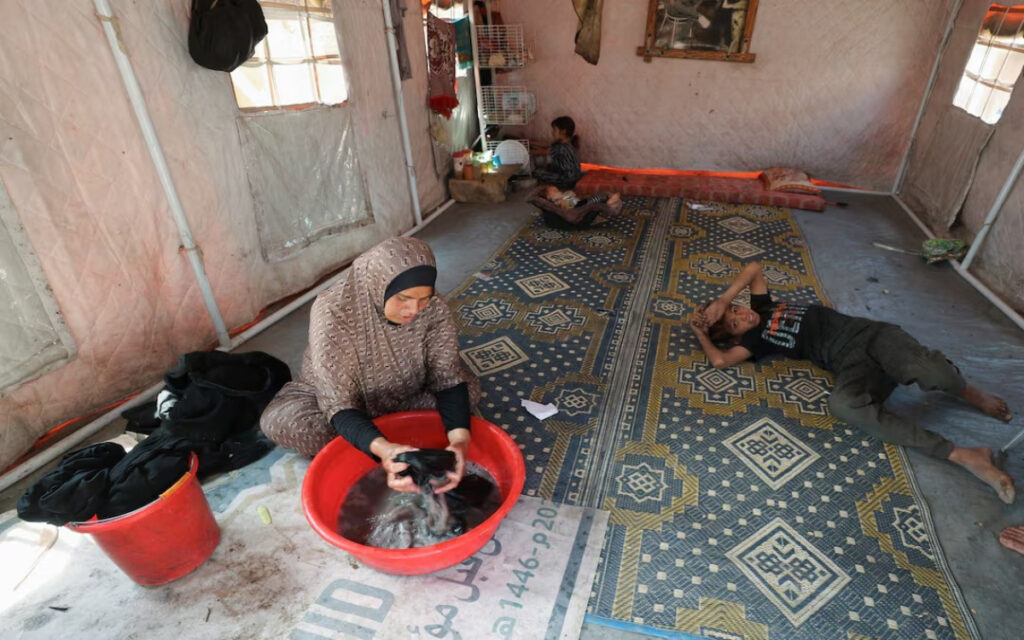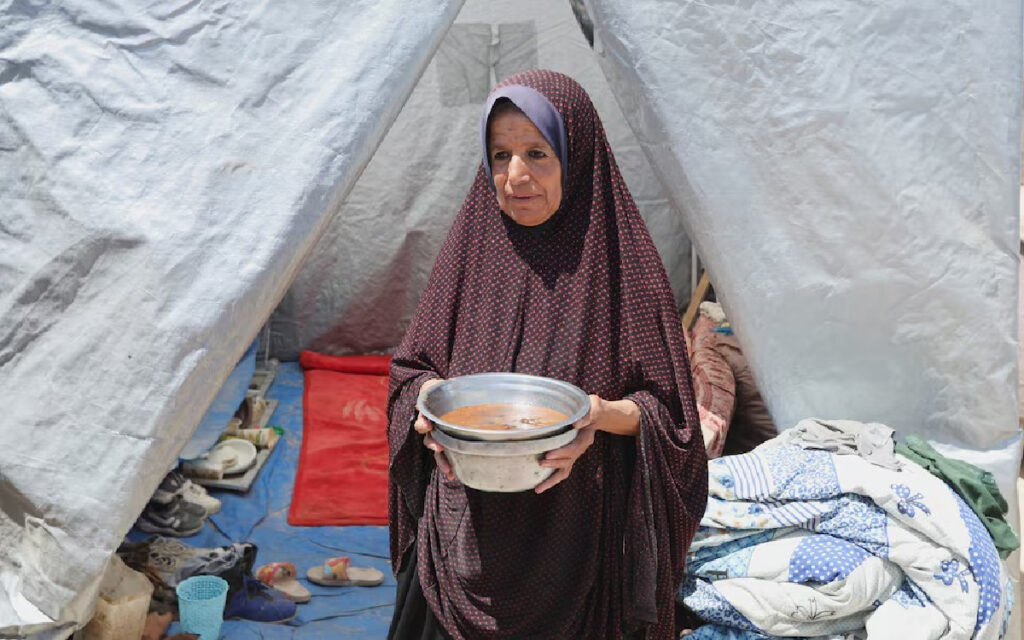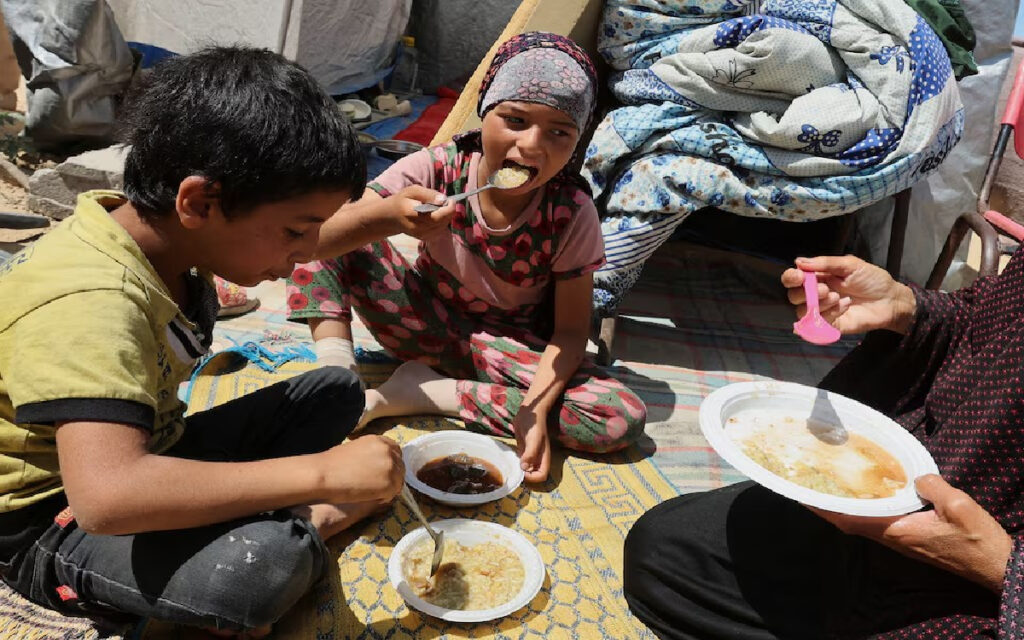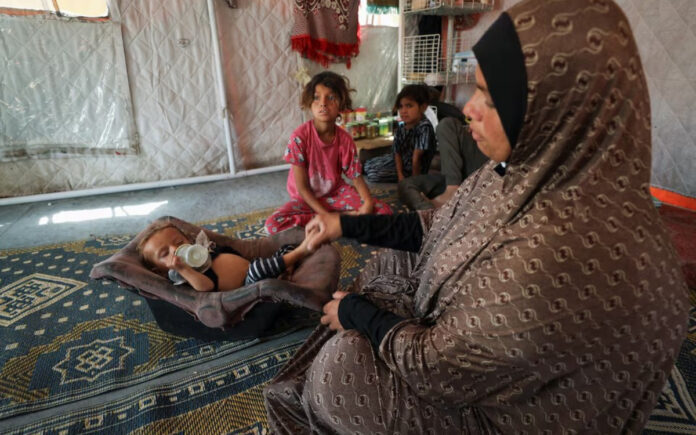Gaza City: In a tent amid the ruins of Gaza City, Mervat Hijazi and her nine children are living a grim reality: days without food, nights filled with fear, and a relentless struggle to survive. On Thursday, they ate nothing — except for a sachet of peanut paste given to her underweight baby by a clinic.
“I’m so ashamed of myself for not being able to feed my children,” Hijazi told Reuters. “I cry at night when my baby cries and her stomach aches from hunger.”
Her six-year-old daughter, Zaha, can’t sleep — not just from hunger, but from the trauma of nightly airstrikes.
“She wakes up terrified, shaking, and then remembers she didn’t eat and is hungry. I put her back to sleep, promising her food in the morning. Of course I lie.”
At 38, Hijazi recounted to reporters the bitter journey her family has endured over the past week — a painful diary of diminishing aid and desperate measures.

A Week of Hunger
- Sunday, May 18: The family received about half a kilo of cooked lentils — just a fraction of what Hijazi would typically use for one meal.
- Monday: A local aid group tried to distribute vegetables in the camp, but there wasn’t enough. Her daughter Menna managed to get a small portion of cooked potato from the community kitchen. The rest of the family drank water to suppress their hunger.
- Tuesday: They were given half a kilo of cooked pasta. One daughter also received some falafel from a nearby relative.
- Wednesday: A relatively better day. They got a bowl of rice with lentils, and Menna persuaded the kitchen to provide two additional small dishes. “She is tough and keeps crying at them until they give her.”
- Thursday: The kitchen was closed for unknown reasons. The only food they had was the peanut paste given to 11-month-old Lama as a nutritional supplement. “I don’t have enough milk in my breasts to feed her because I hardly eat myself,” said Hijazi. Her husband, a plumber, was killed early in the war while cycling to get food.
Their story is just one of thousands emerging from Gaza, where famine looms and more than half a million people are at risk of starvation, according to global hunger monitors.


A Crisis Deepens
Since Hamas launched a surprise attack on Israeli border communities on October 7, 2023, killing 1,200 people according to Israeli authorities, Gaza has faced unrelenting bombardment. The Israeli offensive, which followed the Hamas attack, has killed more than 53,000 people, according to Gazan health officials.
Israel insists sufficient aid is entering Gaza and accuses Hamas of diverting it to its fighters — a claim Hamas denies. This week, Israel allowed some food into the enclave for the first time since March 2, including flour and baby formula, under a new U.S.-backed plan. However, aid organizations and the United Nations have criticized the distribution system, warning it will cause further displacement.
Also Read | US Takes First Step Toward Rebuilding Syria with Sanctions Relief
Despite the new aid plan, Hijazi said her family has seen no improvement. Baby Lama weighs just 5 kilograms — nearly half the healthy average for her age, based on WHO standards.
“This week the family have had, at most, a single meal a day to share,” she said.
UN aid chief Tom Fletcher has described the Israeli-approved aid flow as “a drop in the ocean” compared to what is actually needed on the ground.
Displacement, Loss, and Endurance
The Hijazi family originally lived in the Sabra district of Gaza City. When her husband Mohammed was killed on November 17, 2023, they fled south to Deir al-Balah, staying first with relatives and then moving into a displacement camp. After a temporary ceasefire in January, they returned home to find it damaged and uninhabitable. Now, they live in a tent.
Inside the makeshift shelter, a portrait of Mohammed hangs on the wall above a thin mattress and nearly empty food jars. Hunger has drained the family of strength and energy. “They often lack the strength to clean the tent,” said Hijazi. When Reuters visited, some of the children lay silently on the floor, too weak to speak.
Despite their fatigue, the children have responsibilities. Menna, 14, often queues at the food kitchen, sometimes for hours. Her brothers Mustafa, 15, and Ali, 13, fetch water in jerrycans from a standpipe in another district when tankers don’t arrive — an exhausting task under normal circumstances, made worse by hunger.
Also Read | U.S. Vows More Sanctions on Cuba Over Crackdown on Dissidents
They remember life before the war. Mohammed’s work as a plumber had provided a decent living. “People used to envy us for the variety of food we had,” said Hijazi. Mornings meant eggs, cheese, falafel, and fresh bread. Now, survival depends on aid and the goodwill of strangers.
Her 16-year-old daughter Malik longs for the meals they once enjoyed. “We are civilians. We have no say in this war. All we want is for the war to end,” said Hijazi. “We want to go back to live in homes — real homes. We want to sleep with full stomachs and in peace, not scared of dying while we sleep.”



